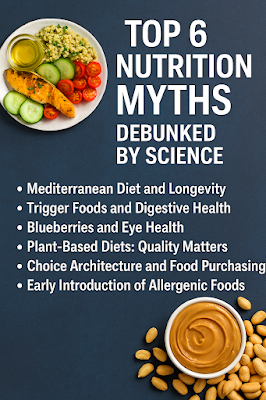Top 6 Nutrition Myths Debunked by Science
1. Mediterranean Diet and Longevity
The Mass General Brigham press release reports that in over 25,000 women followed for 25 years, adherence to a Mediterranean diet was associated with a 23% lower risk of mortality. Each additional component (fruits, vegetables, legumes, olive oil, nuts, fish) decreased long-term death risk by ~5% . This diet reduces inflammation, improves insulin sensitivity, and supports heart and cancer prevention.
2. Trigger Foods and Digestive Health
Dr. Kyle Staller at Mass General notes that gastrointestinal symptoms often stem from the enteric nervous system, not just individual foods. Rather than eliminating specific triggers, a more effective strategy is addressing underlying neuromuscular responses in the gut .
3. Blueberries and Eye Health
A study of nearly 40,000 women found eating ≥1 serving of blueberries per week resulted in a 28% reduced risk of age-related macular degeneration. Anthocyanins in blueberries have potent antioxidant effects on the retina .
4. Plant-Based Diets: Quality Matters
Mass General experts emphasize that not all plant-based diets yield health benefits. Diets high in processed plant foods and sugary drinks can worsen health, while those rich in whole fruits, vegetables, whole grains, nuts, and healthy fats are linked to lower risks of diabetes, obesity, and gout .
5. Choice Architecture and Food Purchasing
“Choice architecture”—the placement of foods—affects consumer selection. In hospital cafeterias, color-coded cues (e.g., green for healthy) led to more nutritious choices. Supermarkets often leverage this by placing unhealthy snacks near checkouts .
6. Early Introduction of Allergenic Foods
The groundbreaking LEAP study (2015) and its long-term follow-ups (LEAP‑On and LEAP‑Trio) show that introducing peanuts between 4–6 months can reduce peanut allergy risk by 70–81% by age five, with protection persisting into adolescence (age 12) . Infants at high risk (eczema, family history) benefit most. Global guidelines now recommend early introduction of peanut, egg, dairy, and wheat within the first year, ideally before 6 months .
Other Recent Scientific Insights
- Time‑restricted eating: A 2025 Mass General Brigham study finds that confining eating to daytime hours significantly reduces cardiovascular risk factors .
- Seed oils: Contrary to claims labeling them “toxic,” oils rich in polyunsaturated fats are beneficial replacements for saturated fats .
- Ultra-processed foods: A “TrueFood” database analyses over 50,000 food items, linking ultra-processed diets to higher obesity, diabetes, and heart disease rates .
- Meat and dementia risk: Consumption of processed red meat increases dementia risk by ~13%, whereas replacing it with nuts, legumes, or fish may reduce risk by ~20% .
- Diet diversity in infants: Early introduction of various allergens supports gut microbiome development and may reduce overall allergy risk .
A scientific, balanced approach to nutrition is essential. The Mediterranean diet, early allergen introduction, and whole plant-based foods consistently show benefits, while simplistic eliminations or fad dietary patterns may backfire. Arrange a personalized plan with a dietitian, gastroenterologist, or allergist for best results.
References
- Mass General Brigham: Debunking food misconceptions
- FARE: Celebrating 10th anniversary of LEAP Study (May 21, 2025)
- Mass General Brigham: Time-restricted eating and cardiovascular health
- Mass General: Seed Oils – Facts & Myths (Oct 2024)
- Mass General Brigham: TrueFood processed food database
- LEAP-Trio follow-up results (May 2024)
- News‑Medical: Diet diversity and allergy outcomes (Mar 2025)
- The Guardian: Peanut introduction cuts allergy risk
- Processing and allergen exposure data (LEAP‑Trio)
- The Times/The Times article on meat and dementia risk








Comments
Post a Comment